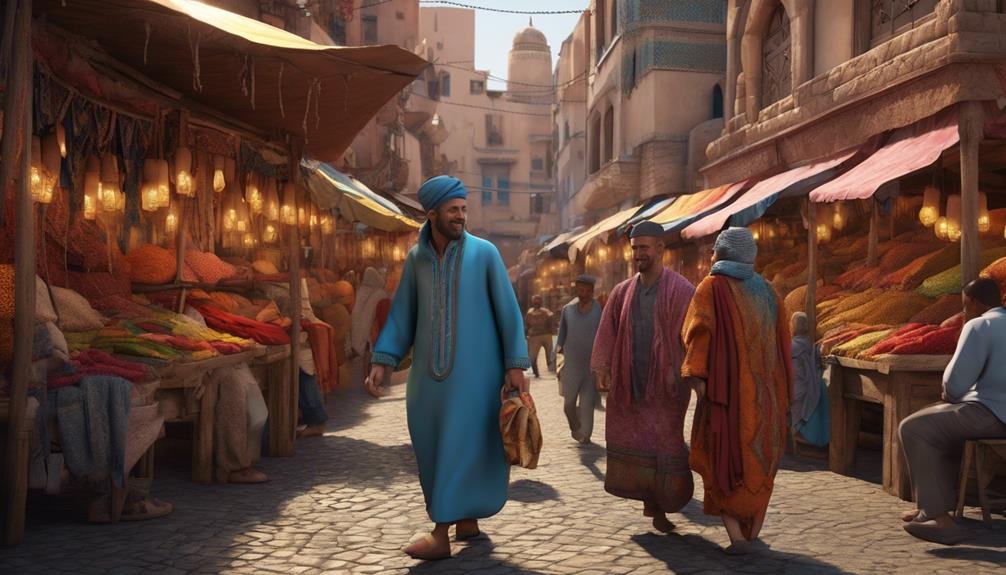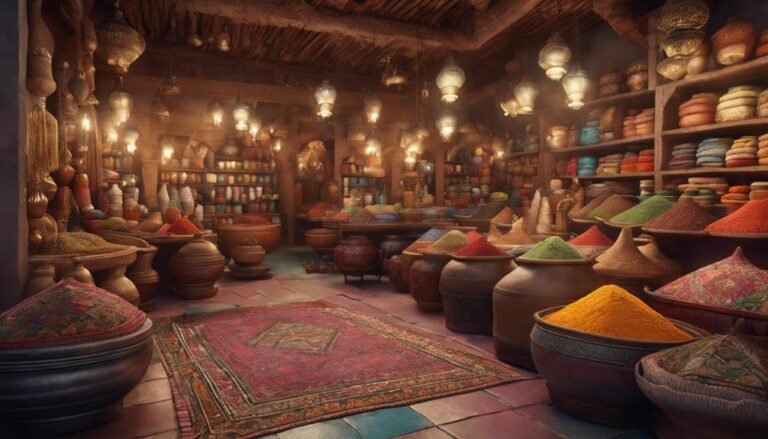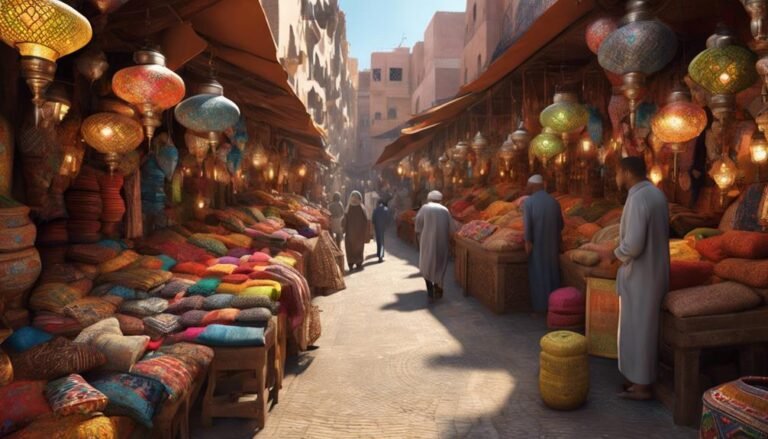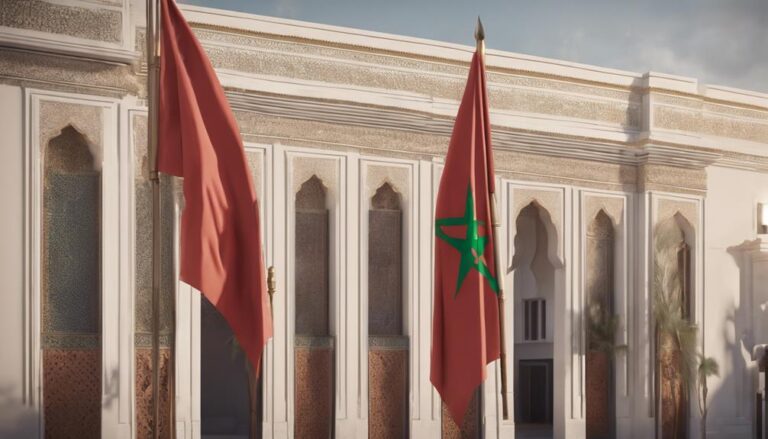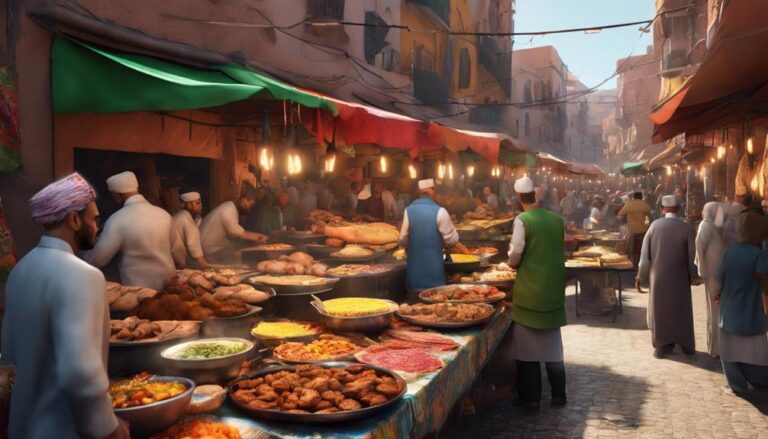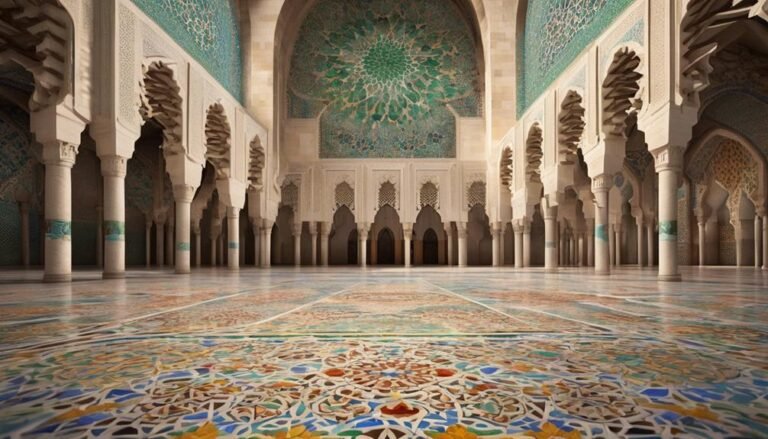To respect local customs in Morocco, start with proper greetings, like handshakes and removing shoes indoors. Dress modestly, covering shoulders, arms, and knees. When dining, use your hands and accept offered food graciously. It's important to understand Islamic customs, respecting prayer times and participating respectfully. Traditional celebrations involve intricate dances and sharing food for unity. Explore the rich culinary traditions through workshops and food festivals. Bargain in markets, show interest in the local language, and be mindful of gender roles and taboos. Tipping customs show appreciation and enhance interactions. Embracing these practices will enrich your experiences in Morocco.
Key Takeaways
- Dress modestly, covering shoulders, arms, and knees.
- Use right hand for greetings and receiving items.
- Participate respectfully in mosque activities.
- Learn and use common greetings like 'As-salamu alaykum'.
- Be mindful of cultural taboos like public displays of affection.
Greetings and Etiquette
When visiting Morocco, it's important to understand and respect the local customs regarding greetings and etiquette to guarantee smooth interactions with the locals. Cultural greetings and social norms play a significant role in Moroccan society. Proper introductions are vital, so when meeting someone for the first time, it's customary to greet them with a handshake. However, it's essential to note that some individuals of the opposite gender may prefer not to shake hands for religious reasons; in such cases, a nod or a smile suffices.
Respectful gestures are highly valued in Morocco. When entering a home or a mosque, it's customary to remove your shoes as a sign of respect. Additionally, when offering or receiving something, it's polite to use your right hand, as the left hand is traditionally considered unclean. Being mindful of these small yet significant details can go a long way in showing respect for Moroccan customs and fostering positive interactions with the locals.
Dress Code Dos and Donts
To adhere to the local customs in Morocco, it's essential to be mindful of the appropriate dress code dos and don'ts when interacting with the locals. When it comes to fashion choices in Morocco, it's important to dress modestly, especially for women. Wearing loose-fitting clothing that covers the shoulders, arms, and knees is a sign of respect for the local culture. Opt for lightweight and breathable fabrics to stay comfortable in the warm climate while still adhering to cultural sensitivity.
On the flip side, there are certain don'ts to keep in mind. Avoid wearing revealing or tight clothing, as it may be considered disrespectful and inappropriate. Additionally, it's best to refrain from wearing clothing with offensive language or imagery, as this can be offensive to the local population.
Dining Customs and Etiquette
When dining in Morocco, it's essential to pay attention to seating arrangements, as hierarchies are often reflected in where individuals sit.
The use of hands for eating is common, so it's advisable to follow suit to respect local customs.
Additionally, accepting food when offered is seen as a gesture of hospitality, but declining politely is also acceptable.
Seating Arrangements at Meals
Proper seating arrangements at meals in Morocco play an important role in showcasing respect for local customs and etiquette. Understanding the seating hierarchy and cultural norms is vital.
In Moroccan dining settings, there's often a designated place of honor at the head of the table for the most esteemed guest or the host. It's essential to follow these seating arrangements to show respect for social hierarchy and traditions.
Additionally, observing table manners and social expectations is key during meals. For instance, it's customary to wait for the host or the eldest to start eating before you begin.
Being mindful of these customs demonstrates your appreciation for Moroccan traditions and enhances the overall dining experience for everyone involved.
Use of Hands
Understanding the appropriate use of hands in Moroccan dining customs and etiquette is a vital aspect of respecting local traditions and cultural norms. In Morocco, hand gestures are an essential part of communication, and being mindful of their cultural significance is essential.
Here are some key points to keep in mind:
- Right Hand Rule: Always use your right hand for eating, passing items, or gesturing during meals.
- Avoid Using Left Hand: The left hand is traditionally considered unclean, so refrain from using it for any dining-related activities.
- Respectful Gestures: Hand gestures can convey respect or disrespect, so be attentive to your movements while dining.
- Learn Common Gestures: Familiarize yourself with common gestures used in Moroccan dining to avoid misunderstandings and show cultural sensitivity.
Accepting or Refusing Food
In Moroccan dining customs and etiquette, being mindful of how to gracefully accept or decline food is crucial to showing respect for local traditions and cultural norms. When faced with food offerings in Morocco, it is important to display cultural sensitivity and respect hospitality customs. If you have dietary restrictions, communicate them politely to your host to make certain they understand and can accommodate your needs. Below is a table illustrating the significance of accepting or refusing food in Moroccan dining customs.
| Accepting Food | Declining Food | Cultural Sensitivity |
|---|---|---|
| Accept with right hand | Politely refuse | Acknowledge generosity |
| Express gratitude | Provide a valid reason | Respect cultural norms |
| Try a bit of everything | Thank the host | Appreciate the gesture |
Understanding these nuances can help you navigate dining experiences in Morocco with grace and respect.
Understanding Religious Practices
While visiting Morocco, it's important to be aware of the various religious practices observed by the local population. Understanding and respecting these customs will help you navigate the cultural landscape with sensitivity and appreciation.
- Religious Observances: Moroccans mostly practice Islam, so being mindful of Islamic customs and traditions is essential for showing respect to the local community.
- Prayer Customs: In Morocco, Muslims follow specific prayer times throughout the day. It's customary to pause and respect these times, especially during the call to prayer, known as the Adhan.
- Community Respect: Participating in local mosque activities or events can provide valuable insights into Moroccan religious life. However, always remember to dress modestly and be respectful when entering religious sites.
- Cultural Sensitivity: Understanding the significance of religious holidays and practices, such as Ramadan, can help you engage more meaningfully with the local community and avoid unintentional cultural misunderstandings.
Traditional Moroccan Celebrations
As you delve deeper into the Moroccan culture, you'll discover the intricate dances that are an integral part of these celebrations, showcasing the skill and grace of the performers. These traditional dances often tell stories or convey emotions through movement, adding another layer of beauty and meaning to the festivities.
In addition to the music, attire, and dances, Moroccan celebrations are also characterized by the warm hospitality and sense of community that permeate every gathering. Guests are welcomed with open arms, and sharing food and drink is a central part of the festivities, fostering a sense of unity and connection among all those in attendance.
This combination of music, dance, attire, and hospitality creates a truly immersive and unforgettable experience for anyone fortunate enough to participate in these traditional Moroccan celebrations.
Festive Moroccan Music
During traditional Moroccan celebrations, the vibrant and rhythmic festive Moroccan music encapsulates the rich cultural heritage of the country. This music is an integral part of the festivities, setting the mood and bringing people together in joyous celebration.
Here are some key aspects of festive Moroccan music:
- Festive Dances: Moroccan music often accompanies traditional festive dances like the lively 'Aissaoua' and the energetic 'Guedra,' adding an extra layer of excitement to the celebrations.
- Traditional Rhythms: The music is characterized by intricate rhythms that reflect the diverse influences present in Moroccan culture, blending Berber, Arab, and African elements harmoniously.
- Musical Instruments: Instruments like the oud (a pear-shaped stringed instrument), the bendir (a large frame drum), and the qraqeb (metal castanets) are commonly used, each holding cultural significance.
- Cultural Significance: Festive Moroccan music not only entertains but also serves as a way to preserve and pass on the country's rich cultural traditions from one generation to the next.
Colorful Traditional Attire
The vibrant and rhythmic festive Moroccan music sets the stage for the next aspect of traditional celebrations – the colorful traditional attire worn during these cultural festivities.
Cultural festivals in Morocco are a sight to behold, with locals adorning themselves in garments of vibrant colors that reflect the country's rich heritage.
Traditional Moroccan attire can often be found in local markets, where intricately designed fabrics and garments catch the eye with their intricate patterns and bold hues. Women may wear kaftans, beautifully embroidered dresses with flowing silhouettes, while men opt for djellabas, long hooded robes that exude elegance.
These traditional garments not only showcase the artistry of Moroccan craftsmanship but also play a significant role in preserving the cultural identity of the country during festive occasions.
Rich Culinary Traditions
Exploring the rich culinary traditions of traditional Moroccan celebrations reveals a tapestry of flavors and aromas that captivate the senses and honor centuries of culinary expertise. Moroccan cuisine is a blend of Berber, Arabic, and Mediterranean influences, creating a diverse and vibrant food culture.
To immerse yourself in this culinary world, consider participating in:
- Culinary workshops: Learn the art of making traditional dishes like tagine, couscous, and pastilla from local chefs.
- Food festivals: Attend local food festivals where you can taste a wide variety of dishes and experience the joyous atmosphere of Moroccan celebrations.
- Market tours: Explore bustling markets to discover fresh spices, herbs, and ingredients that form the foundation of Moroccan cuisine.
- Cooking classes: Take cooking classes to master the intricate techniques and flavors that make Moroccan food so unique.
Shopping Etiquette and Tips
When exploring the bustling markets of Morocco, it's crucial to have a keen eye for quality and approach local vendors with respect. Bargaining is a common practice in Moroccan markets, so engaging in a friendly negotiation while considering the item's value and being respectful of the seller is important. Handmade crafts are abundant in local markets, offering unique cultural souvenirs that showcase the rich artisanal traditions of Morocco.
While navigating through the maze of stalls, take your time to admire the craftsmanship of the items on display. Locally made goods often consist of leather products, ceramics, textiles, and intricate metalwork. Before making a purchase, examine the quality of the item and feel free to inquire about its origin or production process. Remember that establishing a rapport with the vendor can sometimes result in a better deal. By respecting the artistry and traditions behind each piece, you not only bring home a special souvenir but also pay homage to the cultural heritage of Morocco.
Language and Communication Tips
When communicating in Morocco, it's important to familiarize yourself with common greetings and phrases used in the local language to show respect and build rapport with the locals.
Pay attention to non-verbal cues such as body language and gestures, as they can convey important messages and help you navigate social interactions more effectively.
Understanding these aspects of language and communication can enhance your cultural experience and facilitate smoother interactions during your stay in Morocco.
Greetings and Phrases
Respecting local customs in Morocco includes understanding and using appropriate greetings and phrases to establish positive communication. When greeting someone in Morocco, consider the following:
- Use Greetings: Start conversations with 'As-salamu alaykum' (Peace be upon you) and respond with 'Wa alaykum as-salam' (And upon you be peace).
- Show Respect: Address elders and those in positions of authority with 'sidi' (Mr.) or 'sayyida' (Mrs).
- Express Gratitude: Say 'Shukran' (Thank you) to show appreciation.
- Use Polite Phrases: Employ phrases like 'B'ssaha' (Bon appétit) or 'Choukran bzaf' (Thank you very much) to display courtesy.
Non-Verbal Cues
Understanding non-verbal cues in Moroccan communication is essential for effective interactions, as gestures and body language play a significant role in conveying messages. In Morocco, body language and cultural gestures are deeply ingrained in the society and can greatly impact the success of your communication. Here are some key non-verbal cues to be mindful of:
| Non-Verbal Cue | Description |
|---|---|
| Eye Contact | Maintaining eye contact shows attentiveness and respect. |
| Hand Gestures | Hand movements are common in conversations, but avoid using your left hand. |
| Personal Space | Moroccans value personal space, so be aware of proximity during interactions. |
| Facial Expressions | Smiling is generally positive, but direct eye contact with the opposite gender may be frowned upon. |
| Posture | Standing or sitting upright is seen as respectful, while slouching may be perceived negatively. |
Gender Roles and Interactions
Gender roles and interactions in Morocco are deeply ingrained in the cultural fabric of the society, influencing daily interactions and social norms. When navigating gender dynamics in Morocco, keep the following points in mind:
- Work Dynamics: In Morocco, traditional gender roles often dictate the division of labor in the workplace. Men commonly hold positions of authority, while women may be more prevalent in certain industries such as education and healthcare.
- Social Norms: Respect for gender roles is important in social settings. It's common for men and women to socialize separately in some contexts, with gatherings often being gender-specific.
- Communication Styles: Pay attention to non-verbal cues when interacting with individuals of the opposite gender. Maintaining a respectful distance and using polite language is essential.
- Public Behavior: Public displays of affection are generally frowned upon in Morocco. Be mindful of how you interact with others, especially across gender lines, to avoid causing offense.
Understanding and respecting these gender dynamics will enhance your cultural experience in Morocco while showing consideration for local customs.
Cultural Taboos to Avoid
Getting around Morocco requires a keen awareness of the cultural taboos to avoid, ensuring a respectful and harmonious interaction with the local community. When visiting Morocco, being mindful of social taboos and cultural norms is important to show respect for the local customs and traditional beliefs. Here are some key cultural taboos to steer clear of during your time in Morocco:
| Cultural Taboos | Description |
|---|---|
| Public Affection | Displaying excessive public affection is frowned upon as it goes against traditional values. |
| Showing Soles of Feet | Revealing the soles of your feet is considered disrespectful, avoid pointing them at others. |
| Using Left Hand | The left hand is traditionally associated with hygiene practices, avoid using it for eating or greeting. |
| Dress Modestly | Dress modestly, especially when visiting religious sites or rural areas to respect local customs. |
Tipping Practices and Guidelines
Exploring Morocco's cultural nuances also involves understanding the local tipping practices and guidelines to ensure a seamless interaction with service providers. When maneuvering tipping customs in Morocco, keep the following guidelines in mind:
- Restaurants: It's customary to leave a tip of around 10% of the total bill in restaurants. Some establishments may include a service charge, so double-check before adding extra.
- Tour Guides: For guided tours, tipping between 50-100 MAD per day is common, depending on the length and quality of the tour.
- Hotel Staff: Tipping hotel staff such as porters or housekeeping with around 10-20 MAD per service is appreciated.
- Taxis: While not mandatory, rounding up the fare is a polite gesture. If the service was exceptional, an additional 10% is a generous tip.
Understanding these cultural nuances around tipping won't only show your appreciation for the services received but also help you smoothly interact during your time in Morocco.
Conclusion
To sum up, respecting local customs in Morocco is essential for a positive cultural experience. By following etiquette guidelines, dressing appropriately, and understanding religious practices, you can show your appreciation for the rich traditions of the country.
Remember, blending in with the locals and embracing their way of life will make your trip to Morocco an unforgettable adventure. So go ahead and immerse yourself in the vibrant culture of this beautiful country – you won't regret it!

The Editorial Team is a passionate group of Morocco enthusiasts dedicated to sharing the beauty, culture, and wonders of this captivating country. With diverse backgrounds and a deep love for travel, we strive to bring you engaging and informative content that inspires your Moroccan adventures. From uncovering hidden gems and sharing local insights to exploring mouthwatering cuisine and showcasing the vibrant lifestyle, our team is committed to providing you with valuable resources and exciting stories that enhance your exploration of Morocco. Join us on this journey as we celebrate the rich heritage and unforgettable experiences that make Morocco truly special.

